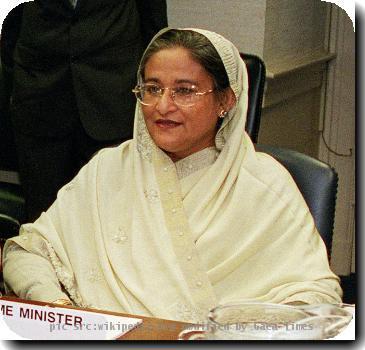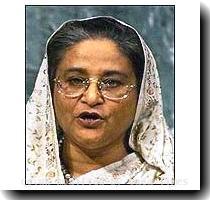India, Pakistan stumble on first step of their talks (Comment)
By Amulya Ganguli, IANSSaturday, February 27, 2010
What the unpleasant aftermath of Thursday’s India-Pakistan talks showed was that cordiality cannot be forced. The trust deficit between the two countries is so high that a dialogue can only lead to more acrimony.
The reason why a tense, constrained atmosphere continues to characterise mutual relations is that some kind of watershed has been crossed in New Delhi’s attitude towards its troublesome neighbour.
India is now fairly convinced that Islamabad is not only unwilling but also unable to act against the terrorists because of the army’s perverse disinclination. It is this perception which led to the unfortunate characterisation by an Indian source of Pakistan foreign secretary Salman Bashir as a virtual puppet in the army’s hands.
It is possible that this uncommonly combative tone was adopted because of the regrettable description of the Indian dossier against the Jamaat-ud-Dawa’s Hafiz Saeed as “literature” by Bashir after his talks with his Indian counterpart, Nirupama Rao.
Although Bashir subsequently tried to backtrack by saying that he did not intend to belittle the Indian allegations, the damage had been done. What was more, it indicated that it would be futile to expect Pakistan to act against these instigators of terror since the Pakistan Army and Inter-Services Intelligence (ISI) would not allow any fetters to be put on Saeed, the suspected mastermind of 26/11, or Al Qaeda’s Ilyas Kashmiri, or the army officers on India’s “wanted” list.
It is worth recalling that on earlier occasions a certain amount of optimism usually prevailed during an India-Pakistan interaction. The reason was that New Delhi expected Islamabad to deliver on its promises.
True, such hopes were not always fulfilled. It is now known, for instance, that Pervez Musharraf never seriously intended to keep his promise not to allow Pakistani soil to be used for terror attacks on India. Even then, there were signs - as Musharraf has indicated - that the two sides were quite close to resolving the dispute over Kashmir.
It was possible to entertain such hopes because Musharraf headed the army which, in Pakistan, is more important than being head of state.
Now, it is the gulf between the civilians and the military in Pakistan which has evidently driven it further from India. The latter is now convinced that the Asif Ali Zardari-Yousuf Raza Gilani duo will not be able to walk the peace talk because the army chief, Ashfaq Pervez Kayani, is the person who calls the shots in Pakistan and not the president or the prime minister.
What is more, Kayani is unlikely to approve of any substantive peace deal because the army and ISI believe that the AfPak region will reach a turning point with the withdrawal of the US forces. Since the resultant vacuum will give an excellent opportunity to the Pakistan Army to install forces inimical to India in Afghanistan, there is little point in making a serious effort at reconciliation.
In fact, as Rao pointed out, the manner in which 26/11 “erased” the mutual confidence which the two countries had built up over the last few years pointed to the presence of elements in Pakistan that were dead against any improvement in ties.
It is the role of these groups which can be seen in Islamabad’s refusal to act against Saeed or Ilyas Kashmiri, let alone the army officers, and in Bashir’s countering of India’s charges of infiltration into Kashmir with allegations of New Delhi’s hand in fomenting trouble in Balochistan.
Although Pakistan says that Saeed has been freed by the judiciary, it is a claim which can seem spurious because of the ease with which the Jamaat-ud-Dawa can hold rallies spouting venom against India despite the UN’s ban on it. Just as Islamabad has ignored the UN diktat, it may have also ensured that the prosecution presented a weak case against the Jamaat chief before the judges. Besides, a judge had once asked the government why the UN ban should be enforced when, in his view, India had not adhered to the UN resolutions on Kashmir.
As if the nurturing of terrorists was not enough, a further complication has been caused by India’s charge that Pakistan was harbouring fugitives from Indian law like the Indian Mujahideen and Khalistani activists. This is a return to the period when Pakistan’s western and eastern wings gave aid and shelter to Indian insurgents, a policy which was continued by Khaleda Zia in Bangladesh. It is only after Sheikh Hasina’s assumption of power in Dhaka that Bangladesh handed over the outlaws of the United Liberation Front of Asom (ULFA) to India.
If the talk about talks by Rao and Bashir has vitiated the atmosphere instead of creating favourable conditions for more interactions, the reason is that, first, a reluctant India was seemingly pushed into it by the US and, second, Pakistan was weighed down by insecurities and complexes.
Some of its apprehensions were available from Bashir’s reference to the need for a military balance in South Asia in the context of the Indian Army chief’s comment about New Delhi being prepared for a war on two fronts. And Pakistan’s inferiority complex was evident from the way its Foreign Minister, Shah Mehmood Qureshi, rushed to Beijing with an appeal to it to intervene as a third party.
In such a murky atmosphere, only back channel negotiations can make some headway to prepare the ground for formal talks.
(27-02-2010-Amulya Ganguli is a political analyst. He can be reached at aganguli@mail.com)

